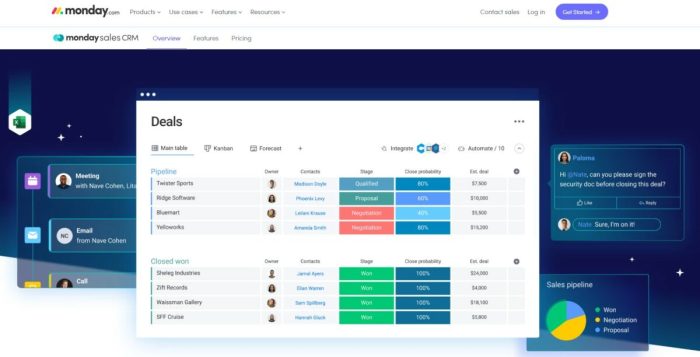Crm and project management software – In today’s dynamic business environment, efficient organization and streamlined workflows are paramount to success. This necessitates the use of robust software solutions that can manage both customer relationships and project execution effectively. While often considered separate entities, Customer Relationship Management (CRM) and Project Management (PM) software are increasingly integrated, offering powerful synergies for businesses of all sizes. This comprehensive guide delves into the intricacies of both, exploring their individual functionalities, their combined benefits, and how to choose the right solution for your specific needs.
Understanding Customer Relationship Management (CRM) Software: Crm And Project Management Software
CRM software is designed to centralize and manage all interactions with customers and potential customers. This encompasses everything from initial contact to ongoing support and beyond. The core objective is to improve customer relationships, boost sales, and enhance overall customer satisfaction. Key features of CRM systems include:
- Contact Management: Storing and organizing customer information, including contact details, communication history, and purchase records.
- Sales Force Automation (SFA): Automating sales processes, such as lead generation, opportunity tracking, and sales forecasting.
- Marketing Automation: Automating marketing tasks like email campaigns, social media management, and lead nurturing.
- Customer Service Management: Managing customer inquiries, complaints, and support requests through various channels (e.g., email, phone, chat).
- Reporting and Analytics: Providing insights into customer behavior, sales performance, and marketing effectiveness.
Types of CRM Software, Crm and project management software
CRM systems are broadly categorized into three types:
- Operational CRM: Focuses on automating business processes and improving efficiency. Examples include sales force automation and customer service management.
- Analytical CRM: Uses data analysis to gain insights into customer behavior and improve decision-making. This often involves data warehousing and business intelligence tools.
- Collaborative CRM: Facilitates communication and collaboration between different departments and stakeholders to improve customer service and satisfaction.
Popular CRM Software Examples
- Salesforce
- HubSpot
- Microsoft Dynamics 365
- Zoho CRM
- SAP CRM
Understanding Project Management Software
Project management software helps teams plan, organize, and execute projects efficiently. It provides tools for task management, collaboration, and progress tracking, ensuring projects are completed on time and within budget. Key features include:
- Task Management: Creating, assigning, and tracking tasks, setting deadlines, and managing dependencies.
- Collaboration Tools: Facilitating communication and collaboration among team members through features like shared calendars, file sharing, and instant messaging.
- Progress Tracking: Monitoring project progress, identifying bottlenecks, and ensuring projects stay on track.
- Resource Management: Allocating and managing resources effectively to optimize project efficiency.
- Reporting and Analytics: Generating reports on project progress, budget, and resource utilization.
Project Management Methodologies Supported
Many project management software solutions support various methodologies, including:
- Agile: An iterative approach that emphasizes flexibility and collaboration.
- Waterfall: A linear approach with clearly defined phases.
- Kanban: A visual system for managing workflow.
- Scrum: A framework for managing and controlling iterative software development projects.
Popular Project Management Software Examples
- Asana
- Trello
- Jira
- Monday.com
- Microsoft Project
The Synergy of CRM and Project Management Software
Integrating CRM and project management software creates a powerful combination that streamlines operations and improves overall business performance. By connecting these systems, businesses can:
- Improve Project Visibility: Track project progress in relation to customer expectations and deadlines.
- Enhance Customer Communication: Maintain seamless communication throughout the project lifecycle.
- Streamline Workflow: Automate tasks and reduce manual effort.
- Boost Team Collaboration: Facilitate seamless information sharing between sales, marketing, and project teams.
- Improve Customer Satisfaction: Deliver projects on time and within budget, exceeding customer expectations.
Choosing the Right Software for Your Business
Selecting the appropriate CRM and project management software depends on several factors, including:
- Business Size and Needs: Small businesses may require simpler solutions, while larger enterprises need more sophisticated systems.
- Budget: Software costs vary significantly, so it’s crucial to consider your budget constraints.
- Integration Capabilities: Ensure the software integrates seamlessly with other business systems.
- Scalability: Choose a solution that can grow with your business.
- User-Friendliness: Opt for software that is intuitive and easy to use for your team.
Frequently Asked Questions (FAQ)
- Q: What is the difference between CRM and project management software? A: CRM focuses on managing customer relationships, while project management software focuses on planning, organizing, and executing projects.
- Q: Can CRM and project management software be integrated? A: Yes, many CRM and project management solutions offer integration capabilities or can be integrated through third-party tools.
- Q: What are the benefits of integrating CRM and project management software? A: Integration improves project visibility, enhances customer communication, streamlines workflow, boosts team collaboration, and improves customer satisfaction.
- Q: How much does CRM and project management software cost? A: Costs vary significantly depending on the features, scalability, and vendor. Some offer free plans, while others have monthly or annual subscription fees.
- Q: What are some key features to look for in CRM and project management software? A: Key features include contact management, sales force automation, task management, collaboration tools, progress tracking, and reporting and analytics.
Conclusion
Effective CRM and project management are crucial for business success. By understanding the individual functionalities of each and the powerful synergies created through integration, businesses can optimize operations, enhance customer relationships, and achieve their goals more efficiently. Choosing the right software requires careful consideration of your specific needs and resources. Investing in the right tools can significantly impact your bottom line and contribute to long-term growth.
References
Call to Action
Ready to streamline your business processes and improve customer relationships? Explore the leading CRM and project management software solutions today and find the perfect fit for your organization!

Source: ecomstrive.com
Questions and Answers
What are the key benefits of integrating CRM and project management software?
Key benefits include improved communication, better resource allocation, enhanced project visibility, increased client satisfaction, and data-driven decision-making.
What types of businesses would benefit most from this integration?
Businesses of all sizes, particularly those with complex projects and a significant client base, can benefit. This includes professional services firms, marketing agencies, and software development companies.
What are some common challenges in integrating CRM and project management software?
Common challenges include data migration, system compatibility issues, and the need for employee training. Careful planning and selection of compatible systems are crucial.

Source: teamgate.com
How much does CRM and project management software typically cost?
Costs vary widely depending on the features, scalability, and vendor. Options range from affordable cloud-based solutions to more expensive enterprise-level systems.
